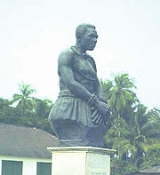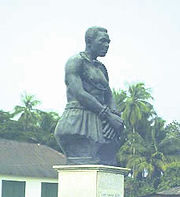
Nana Olomu
Encyclopedia
Nana Olomu(1852–1916) was an Itsekiri
chief and merchant from the Niger Delta
region of southern Nigeria
. He was the fourth Itsekiri chief to hold the position of Governor of Benin River.

Consul for the Bights of Benin and Biafra, John Beecroft
, established the post of Governor of Benin River and gave it to an Itsekiri chief, Idiare. The governorship was intended to pass back and forth between two prominent Itsekiri families, the Emaye and the Ologbotsere. However, upon the death of his father, an Ologbotsere, the governorship was passed directly to Nana Olomu, instead of one of the Emaye.
In 1884 Nana Olomu, the fourth Governor of Benin River, signed a treaty on behalf of the Itsekiri, granting the British further rights in Itsekiriland. The relations between the two were peaceful until the Berlin Conference
of 1884-85 and the ensuing Scramble for Africa
, which led the British to try to bypass the Itsekiri middlemen so as to trade directly with the Urhobo
. A further complication was that because of technical improvements in shipping European traders could travel further into the interior than previously, ending their former reliance on the coastal chieftains as middlemen.
. Following his arrest he was deported to the Gold Coast
(Ghana
.)
In Britain in 1899 the Aborigines' Protection Society
complained to the Foreign Office about "the arbitrary treatment" to which the chief had been subjected, the government's failure to carry out "the searching investigation of his case which he had always sought", and appealed for him to be given liberty to conduct his commercial affairs freely even if, for political reasons, he could not be restored to his old position. A letter from Olomu was also enclosed complaining his maintenance was inadequate for him to support himself and five other persons. In his reply the then Prime Minister the Marquis of Salisbury promised to look into the conditions of the chief's maintenance, but ruled out the possibility of a return to his homeland. A month later the question of his treatment was raised in parliament and the government again stated it would be unsafe to allow his return.
, held in the National Maritime Museum
in London, is one of four brought back from Africa by British forces involved in the late 19th century conflicts there. There is some uncertainty as to whether the flag is of Benin
origin, or like the other three belonged to an Itsekiri ship loyal to Nana Olomu. One of the flags in the Museum's collection certainly belonged to forces of Nana Olomu.
.
Itsekiri
The Itsekiri are an ethnic group of Nigeria's Niger Delta area, Delta State. The Itsekiri presently number between 800,000–1,000,000 people and live mainly in the Warri South, Warri North and Warri South West local government districts of Delta State on the Atlantic Coast of Nigeria...
chief and merchant from the Niger Delta
Niger Delta
The Niger Delta, the delta of the Niger River in Nigeria, is a densely populated region sometimes called the Oil Rivers because it was once a major producer of palm oil...
region of southern Nigeria
Nigeria
Nigeria , officially the Federal Republic of Nigeria, is a federal constitutional republic comprising 36 states and its Federal Capital Territory, Abuja. The country is located in West Africa and shares land borders with the Republic of Benin in the west, Chad and Cameroon in the east, and Niger in...
. He was the fourth Itsekiri chief to hold the position of Governor of Benin River.

Background to conflict with the British
In 1851 the BritishBritish Empire
The British Empire comprised the dominions, colonies, protectorates, mandates and other territories ruled or administered by the United Kingdom. It originated with the overseas colonies and trading posts established by England in the late 16th and early 17th centuries. At its height, it was the...
Consul for the Bights of Benin and Biafra, John Beecroft
John Beecroft
John Beecroft was an explorer, governor of Fernando Po and British Consul of the Bight of Benin and Biafra.-Early life:Beecroft was born in England near the port of Whitby, Yorkshire...
, established the post of Governor of Benin River and gave it to an Itsekiri chief, Idiare. The governorship was intended to pass back and forth between two prominent Itsekiri families, the Emaye and the Ologbotsere. However, upon the death of his father, an Ologbotsere, the governorship was passed directly to Nana Olomu, instead of one of the Emaye.
In 1884 Nana Olomu, the fourth Governor of Benin River, signed a treaty on behalf of the Itsekiri, granting the British further rights in Itsekiriland. The relations between the two were peaceful until the Berlin Conference
Berlin Conference
The Berlin Conference of 1884–85 regulated European colonization and trade in Africa during the New Imperialism period, and coincided with Germany's sudden emergence as an imperial power...
of 1884-85 and the ensuing Scramble for Africa
Scramble for Africa
The Scramble for Africa, also known as the Race for Africa or Partition of Africa was a process of invasion, occupation, colonization and annexation of African territory by European powers during the New Imperialism period, between 1881 and World War I in 1914...
, which led the British to try to bypass the Itsekiri middlemen so as to trade directly with the Urhobo
Urhobo people
The Urhobo are people of southern Nigeria, near the northwestern Niger River delta. The Urhobo is the major ethnic group in Delta State; the Delta State is one of the 36 states of the Federal Republic of Nigeria. They speak Urhobo, a language in Niger–Congo group...
. A further complication was that because of technical improvements in shipping European traders could travel further into the interior than previously, ending their former reliance on the coastal chieftains as middlemen.
Attacks on the Urhobo
Following this development the relations between the Itsekiri, led by Olomu, and the British began to decline. In 1892 and 1893 direct treaties between the British and the Urhobo further angered Olomu. In retaliation for the perceived bypassing of the Itsekiri, Olomu's men attacked some of the nearby Urhobo villages which had been exchanging goods with the British. This led to the Urhobo halting their trading, and the British responded by cracking down on the Itsekiri. In 1894 several other Itsekiri chiefs signed a new treaty with the British, and soon after Olomu surrendered in LagosLagos
Lagos is a port and the most populous conurbation in Nigeria. With a population of 7,937,932, it is currently the third most populous city in Africa after Cairo and Kinshasa, and currently estimated to be the second fastest growing city in Africa...
. Following his arrest he was deported to the Gold Coast
Gold Coast (British colony)
The Gold Coast was a British colony on the Gulf of Guinea in west Africa that became the independent nation of Ghana in 1957.-Overview:The first Europeans to arrive at the coast were the Portuguese in 1471. They encountered a variety of African kingdoms, some of which controlled substantial...
(Ghana
Ghana
Ghana , officially the Republic of Ghana, is a country located in West Africa. It is bordered by Côte d'Ivoire to the west, Burkina Faso to the north, Togo to the east, and the Gulf of Guinea to the south...
.)
In Britain in 1899 the Aborigines' Protection Society
Aborigines' Protection Society
The Aborigines' Protection Society was an international human rights organisation, founded in 1837, to protect the health and well-being and the sovereign, legal and religious rights of the indigenous peoples subjected by colonial powers. The Society published tracts, pamphlets, Annual Reports and...
complained to the Foreign Office about "the arbitrary treatment" to which the chief had been subjected, the government's failure to carry out "the searching investigation of his case which he had always sought", and appealed for him to be given liberty to conduct his commercial affairs freely even if, for political reasons, he could not be restored to his old position. A letter from Olomu was also enclosed complaining his maintenance was inadequate for him to support himself and five other persons. In his reply the then Prime Minister the Marquis of Salisbury promised to look into the conditions of the chief's maintenance, but ruled out the possibility of a return to his homeland. A month later the question of his treatment was raised in parliament and the government again stated it would be unsafe to allow his return.
Flag
The flag often referred to as the Flag of the Benin EmpireFlag of the Benin Empire
The putative flag of the Benin Empire is a distinctive late 19th-century West African flag, frequently but probably erroneously described as the flag of the Empire of Benin. It is one of four currently held at the National Maritime Museum in Greenwich near London. The Museum however describes...
, held in the National Maritime Museum
National Maritime Museum
The National Maritime Museum in Greenwich, England is the leading maritime museum of the United Kingdom and may be the largest museum of its kind in the world. The historic buildings forming part of the Maritime Greenwich World Heritage Site, it also incorporates the Royal Observatory, Greenwich,...
in London, is one of four brought back from Africa by British forces involved in the late 19th century conflicts there. There is some uncertainty as to whether the flag is of Benin
Benin
Benin , officially the Republic of Benin, is a country in West Africa. It borders Togo to the west, Nigeria to the east and Burkina Faso and Niger to the north. Its small southern coastline on the Bight of Benin is where a majority of the population is located...
origin, or like the other three belonged to an Itsekiri ship loyal to Nana Olomu. One of the flags in the Museum's collection certainly belonged to forces of Nana Olomu.
Museum
Olomu's palace has been converted into a museum, the Nana Living History Museum, which chronicles his interactions with the British. It is located in Koko, Delta StateDelta State
Delta State may refer to:*Delta State, a state in southern Nigeria.*Delta State , a Canadian animated television series.*Delta State University, a public university located in the U.S. state of Mississippi....
.

